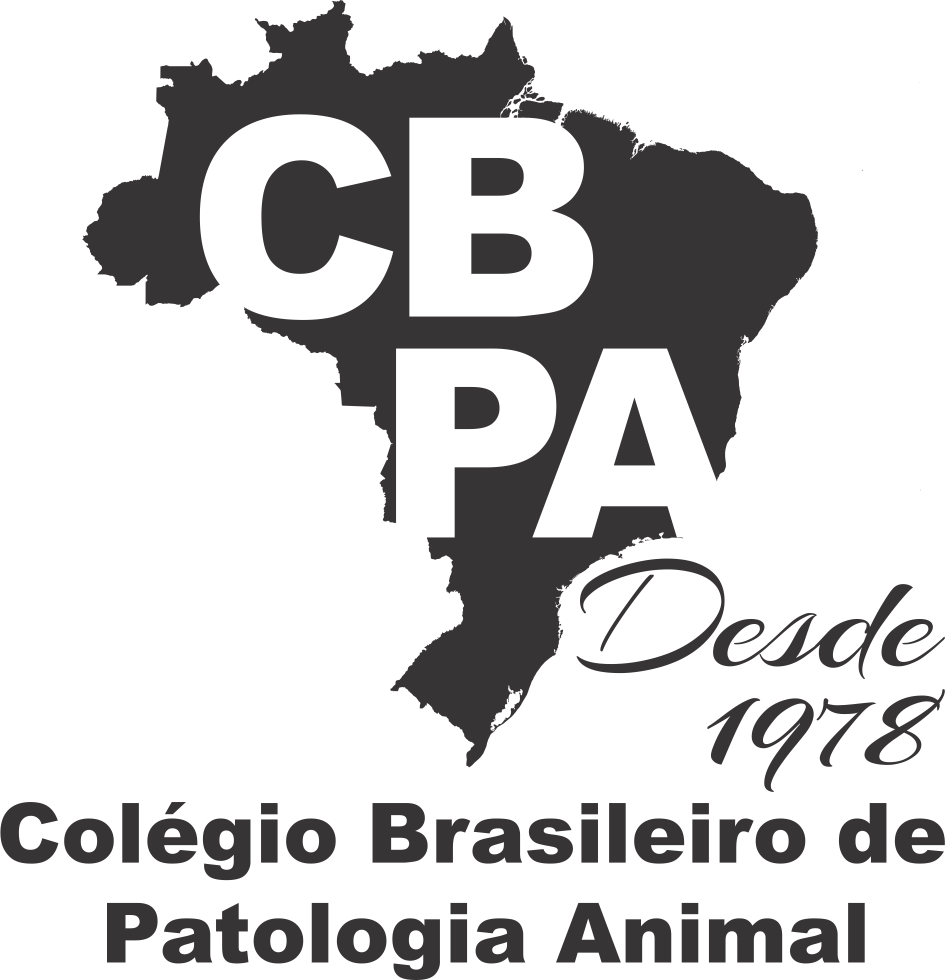Resultado da pesquisa (2)
Termo utilizado na pesquisa fetal protection
#1 - Proteção fetal contra o vírus da diarréia viral bovina (BVDV) em vacas prenhes previamente imunizadas com uma vacina experimental atenuada, p.461-470
Abstract in English:
ABSTRACT.- Arenhart S., Silva L.F., Henzel A., Ferreira R., Weiblen R. & Flores E.F. 2008. [Fetal protection against bovine viral diarrhea virus (BVDV) in pregnant cows previously immunized with an experimental attenuated vaccine.] Proteção fetal contra o vírus da diarréia viral bovina (BVDV) em vacas prenhes previamente imunizadas com uma vacina experimental atenuada. Pesquisa Veterinária Brasileira 28(10):461-470. Departamento de Medicina Veterinária, Centro de Ciências Rurais, Universidade Federal de Santa Maria, 97105-900, Santa Maria, RS, Brazil. E-mail: flores@ccr.ufsm.br
This paper reports the antibody response and fetal protection in pregnant cows conferred by an experimental vaccine containing two attenuated strains of bovine viral diarrhea virus (BVDV-1 and BVDV-2). Cows (n=19) were vaccinated twice, with a 34-days-interval, with the experimental vaccine and together with non-vaccinated controls (n=18), were mated and challenged between days 60 and 90 of gestation by intranasal inoculation of four heterologous BVDV-1 and BVDV-2 isolates. The antibody response was evaluated by serum-neutralization tests performed at different intervals after vaccination (days 34, 78 and 138 post-vaccination [pv]). Fetal protection was monitored by ultrassonographic and clinical examination of the dams and fetuses during the rest of gestation; and through virological and serological examination of pre-colostral blood obtained from aborted and/or recently born fetuses/calves. At the day of challenge (day 138 pv), all vaccinated cows had neutralizing antibodies in high titers against BVDV-1 (1,280- ³10,240), and with one exception (titer 20), presented moderate to high titers to BVDV-2 (80-1,280). At the end of the monitoring, only three out of 18 control cows (16.6%) delivered healthy, virus-free calves. Fifteen non-vaccinated cows (83.3%) presented signs of fetal infection and/or had reproductive losses. Seven of these cows (38.8%) delivered virus-positive calves; five were healthy and survived (27.7%); two were premature or weak and lasted three and 15 days, respectively. The other eight cows (44.4%) aborted between day 30 post-challenge and the parturition; or delivered premature or stillbirth calves. In contrast, 17 out of 19 (89.4%) vaccinated cows delivery virus-free, healthy calves. One vaccinated cow aborted around day 130 post-challenge, yet this fetus could not be examined for the presence of virus. Another cow delivered a virus-positive calf (5.2%). In summary, the experimental vaccine induced adequate antibody titers in most animals and the immunological response induced by vaccination was able to prevent fetal infection and reproductive losses upon challenge with a pool of heterologous BVDV isolates. Hence, this experimental vaccine may be an attractive alternative for the prevention of reproductive losses associated with BVDV infection.
Abstract in Portuguese:
ABSTRACT.- Arenhart S., Silva L.F., Henzel A., Ferreira R., Weiblen R. & Flores E.F. 2008. [Fetal protection against bovine viral diarrhea virus (BVDV) in pregnant cows previously immunized with an experimental attenuated vaccine.] Proteção fetal contra o vírus da diarréia viral bovina (BVDV) em vacas prenhes previamente imunizadas com uma vacina experimental atenuada. Pesquisa Veterinária Brasileira 28(10):461-470. Departamento de Medicina Veterinária, Centro de Ciências Rurais, Universidade Federal de Santa Maria, 97105-900, Santa Maria, RS, Brazil. E-mail: flores@ccr.ufsm.br
This paper reports the antibody response and fetal protection in pregnant cows conferred by an experimental vaccine containing two attenuated strains of bovine viral diarrhea virus (BVDV-1 and BVDV-2). Cows (n=19) were vaccinated twice, with a 34-days-interval, with the experimental vaccine and together with non-vaccinated controls (n=18), were mated and challenged between days 60 and 90 of gestation by intranasal inoculation of four heterologous BVDV-1 and BVDV-2 isolates. The antibody response was evaluated by serum-neutralization tests performed at different intervals after vaccination (days 34, 78 and 138 post-vaccination [pv]). Fetal protection was monitored by ultrassonographic and clinical examination of the dams and fetuses during the rest of gestation; and through virological and serological examination of pre-colostral blood obtained from aborted and/or recently born fetuses/calves. At the day of challenge (day 138 pv), all vaccinated cows had neutralizing antibodies in high titers against BVDV-1 (1,280- ³10,240), and with one exception (titer 20), presented moderate to high titers to BVDV-2 (80-1,280). At the end of the monitoring, only three out of 18 control cows (16.6%) delivered healthy, virus-free calves. Fifteen non-vaccinated cows (83.3%) presented signs of fetal infection and/or had reproductive losses. Seven of these cows (38.8%) delivered virus-positive calves; five were healthy and survived (27.7%); two were premature or weak and lasted three and 15 days, respectively. The other eight cows (44.4%) aborted between day 30 post-challenge and the parturition; or delivered premature or stillbirth calves. In contrast, 17 out of 19 (89.4%) vaccinated cows delivery virus-free, healthy calves. One vaccinated cow aborted around day 130 post-challenge, yet this fetus could not be examined for the presence of virus. Another cow delivered a virus-positive calf (5.2%). In summary, the experimental vaccine induced adequate antibody titers in most animals and the immunological response induced by vaccination was able to prevent fetal infection and reproductive losses upon challenge with a pool of heterologous BVDV isolates. Hence, this experimental vaccine may be an attractive alternative for the prevention of reproductive losses associated with BVDV infection.
#2 - Fetal protection against challenge with bovine viral diarrhea vírus (BVDV) in pregnant ewes immunized with two strains experimentally attenuated, 22(2):64-72
Abstract in English:
ABSTRACT.- Brum M.C.S., Weiblen R., Flores E.F, Tobias F.L., Pituco E.M. & Winkelmann E.R. 2002. [Fetal protection against challenge with bovine viral diarrhea vírus (BVDV) in pregnant ewes immunized with two strains experimentally attenuated.] Proteção fetal frente a desafio com o vírus da Diarréia Viral Bovina (BVDV) em ovelhas prenhes imunizadas com duas amostras de vírus atenuadas experimentalmente. Pesquisa Veterinária Brasileira 22(2):64-72. Depto Medicina Veterinária Preventiva, Centro de Ciências Rurais, Universidade Federal de Santa Maria (DMVP/CCR/UFSM), Santa Maria, RS 97105-900, Brazil. E-mail: flores@ccr.ufsm.br
Two isolates of bovine viral diarrhea virus (BVDV) submitted to multiple passages in tissue culture associated with ultraviolet irradiation were evaluated as vaccine virus candidates. The attenuation of the modified viruses was assessed in calves and in pregnant ewes. Intramuscular inoculation of the viruses in four seronegative calves produced only a mil d and transient rise in body temperature, followed by the production of high titers of neutralizing antibodies. The viruses were not detected in nasal secretions or in the blood following inoculation. However, intramuscular inoculation of these viruses in four pregnant ewes resulted in transplacental transmission and infection of ali fetuses. To assess fetal protection conferred by immunization, pregnant ewes immunized twice with the modified viruses were subsequently challenged by intranasal inoculation of BVDV-1 (SV-126.8, n=6) or BVDV-2 (SV-260, n=5). At the day of challenge (134 days after the second immunization), ali ewes had high titers of neutralizing antibodies (256 to >4096) to the vaccine viruses and variable titers (8 to >4096) to Brazilian BVDV-1 and BVDV-2 field isolates. Fifteen days after challenge, the ewes were euthanized and fetal tissues were examined for infectivity. Ali fetuses from non-vaccinated, challenged ewes (n=4) were infected. In contrast, none of the fetuses from the immunized dams (n = 11) were positive for virus, indicating that the immunological response induced by immunization with the vaccine candidate viruses was capable of preventing fetal infection. These results indicate that it is possible to achieve fetal protection to BVDV by induction of a strong immunological response using modified live vaccines.
Abstract in Portuguese:
RESUMO.- Brum M.C.S., Weiblen R., Flores E.F, Tobias F.L., Pituco E.M. & Winkelmann E.R. 2002. [Fetal protection against challenge with bovine viral diarrhea vírus (BVDV) in pregnant ewes immunized with two strains experimentally attenuated.] Proteção fetal frente a desafio com o vírus da Diarréia Viral Bovina (BVDV) em ovelhas prenhes imunizadas com duas amostras de vírus atenuadas experimentalmente. Pesquisa Veterinária Brasileira 22(2):64-72. Depto Medicina Veterinária Preventiva, Centro de Ciências Rurais, Universidade Federal de Santa Maria (DMVP/CCR/UFSM), Santa Maria, RS 97105-900, Brazil. E-mail: flores@ccr.ufsm.br
Duas amostras do vírus da Diarréia Viral Bovina (BVDV) submetidas a múltiplas passagens em cultivo celular e exposição à radiação ultravioleta (UV) a cada passagem foram avaliadas como candidatos a vírus vacinais. As amostras foram testadas quanto à sua atenuação para bezerros e fetos ovinos, reatividade antigênica contra isolados de campo, e capacidade de induzir proteção fetal em ovelhas prenhes. Inoculação intramuscular (IM) dos vírus modificados em quatro bezerros produziu apenas uma elevação discreta e passageira da temperatura corporal, seguida de produção de altos títulos de anticorpos neutralizantes. O vírus não foi detectado em secreções nasais ou sangue nos dias seguintes à inoculação. Porém, a inoculação IM desses vírus em quatro ovelhas prenhes foi seguida de transmissão transplacentária e infecção em todos os fetos. Para os testes de proteção fetal, ovelhas prenhes previamente imunizadas com duas doses vacinais, foram inoculadas por via intranasal com amostras de BVDV-1 (SV-126.8, n=6) ou BVDV-2 (SV-260, n=5). No dia do desafio (134 dias após a segunda dose), todos os animais apresentavam altos títulos de anticorpos neutralizantes (256 a >4096) contra os vírus vacinais; além de títulos variados (8 a >4096) contra várias isolados brasileiros de BVDV-1 e BVDV-2. Quinze dias após o desafio, as ovelhas foram sacrificadas e os tecidos fetais foram examinados para a presença de vírus. Todos os fetos das ovelhas controle não-vacinadas apresentaram-se (n=4) positivos para os vírus utilizados no desafio. Em contraste, nenhum feto das ovelhas imunizadas (n = 11) foi positivo para vírus, indicando que a resposta imunológica induzida pela vacinação com os vírus modificados foi capaz de prevenir a infecção fetal. Estes resultados indicam que é possível obter-se forte resposta imunológica e proteção fetal contra o BVDV com o uso de vacinas vivas modificadas.









